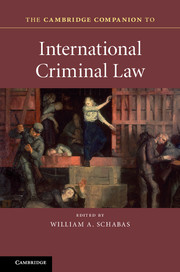Book contents
- Frontmatter
- Dedication
- Contents
- List of contributors
- List of abbreviations
- Introduction
- PART I PURPOSES AND PRINCIPLES
- 1 Human rights and international criminal law
- 2 Truth and justice in atrocity trials
- 3 Transitional justice
- 4 Punishment and sentencing
- 5 Peace
- PART II INSTITUTIONS
- PART III CRIMES
- PART IV TRIALS
- PART V THE FUTURE
- Index
- References
4 - Punishment and sentencing
from PART I - PURPOSES AND PRINCIPLES
Published online by Cambridge University Press: 05 December 2015
- Frontmatter
- Dedication
- Contents
- List of contributors
- List of abbreviations
- Introduction
- PART I PURPOSES AND PRINCIPLES
- 1 Human rights and international criminal law
- 2 Truth and justice in atrocity trials
- 3 Transitional justice
- 4 Punishment and sentencing
- 5 Peace
- PART II INSTITUTIONS
- PART III CRIMES
- PART IV TRIALS
- PART V THE FUTURE
- Index
- References
Summary
How are individuals who are convicted of extraordinary international crimes punished? How ought they to be punished? Do current approaches to punishment attain their stated goals? Regrettably, these crucial questions are understudied. For the most part – as William Schabas has noted – punishment and sentencing linger as afterthoughts within the field of international criminal law. This neglect is somewhat of a pity. After all, what ultimately happens to persons convicted of international crimes matters greatly to victims. Sentencing may also fulfil important narrative functions. Sentencing can serve as a venue to individuate differentiations among perpetrators, in particular within the context of group crimes, and thereby inject granularity into the attribution of responsibility.
Contemporary international criminal courts and tribunals predominantly punish through imprisonment. While restitutionary and reparative remedies can be awarded in some instances, these possibilities remain penumbral. The Trust Fund for Victims, established by the Rome Statute and funded by donor states, has nevertheless supported collective projects and, on this note, may come to more robustly instantiate reparative justice. The Trust Fund disclaims any punitive orientation and operates within a restorative paradigm.
A sentencing practice has emerged within international institutions. This practice can also be aggregated across institutions. The various international institutions are independent. When it comes to sentencing they nonetheless cite extensively to each other's jurisprudence. Such cross-references occur despite the formal absence of the doctrine of stare decisis and proof that the affirmed principle in fact constitutes a general principle of law. This cross-referencing also takes place notwithstanding differences among the mandates and directives of these various institutions as enunciated by their enabling instruments. On the other hand, the need to individualise the penalty means that previous sentencing practices provide only limited assistance.
When national institutions are called upon to punish individuals convicted of genocide, crimes against humanity, and systematic war crimes, the national penological framework of the state in question governs the punishment that is meted out. Although greater diversity of sanction arises at national levels, incarceration once again emerges as the preferred modality of punishment. Within the context of incarceration, considerable variation arises among national legal systems as to the norms of sentence severity (both in the case of international crimes and ordinary common crimes).
- Type
- Chapter
- Information
- The Cambridge Companion to International Criminal Law , pp. 73 - 96Publisher: Cambridge University PressPrint publication year: 2016



